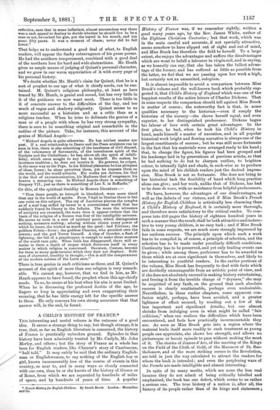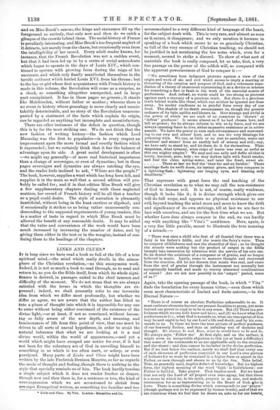A CHILD'S HISTORY OF FRANCE.*
THIS interesting and useful volume is the outcome of a good idea. It seems a strange thing to say, but though strange, it is true, that, so far as English literature is concerned, the history of France is practically unbroken ground. Episodes in that history have been admirably treated by Mr. Carlyle, Mr. John Morley, and others ; but the story of France as a whole has been for English readers, like Chaucer's story of Cambuscan, "hail told." It may safely be said that the ordinary English- man or Englishwoman, to say nothing of the English boy or girl, knows immeasurably less of the course of events in this country, so near to, and in many ways so closely connected with our own, than he or she knows of the history of Greece or of Rome, from which we are separated by hundreds of miles of space, and by hundreds of years of time. A popular
• French Historgfor English Children. By Sarah Brook. London : Macmillan and Co.
History of France was, if we remember rightly, written a good many years ago, by the Rev. James White, author of the Eighteen Christian Centuries; but that work, which was in the main careful and accurate, if not specially attractive, seems somehow to have slipped out of sight and out of mind, and Miss Brook has therefore the field to herself. To a large extent, she enjoys the advantages and suffers the disadvantages which are wont to befall a labourer in virgin soil, and in saying, as we honestly can say, that she has taken the fullest advan- tage of the former, and has suffered as little as possible from, the latter, we feel that we are passing upon her work a high, but certainly not an unmerited, enlogium.
It is almost impossible to avoid a comparison between Miss. Brook's volume and the well-known book which probably sug- gested it, that Child's History of England which was one of the happiest results of the active leisure of Charles Dickens. That in some respects the comparison should tell against Miss Brook is matter of course ; the noteworthy fact is that, in some qualities necessary to the historian—even if simply the historian of the nursery—she shows herself equal, and even superior, to her distinguished predecessor. Dickens began his labour of love with certain great advantages. In the first place, he had, when he took his Child's _History in hand, made himself a master of narration, and in all popular historical work bright and flowing narrative is always one of the largest constituents of success ; but he was still more fortunate in the fact that his materials were arranged ready to his hand ; that, to change the figure, his figures had been grouped and his landscape laid in by generations of previous artists, so that he had nothing to do but to sharpen outline, to brighten colour, to intensify light and shade, in such-wise as to producer upon the mind of his childish readers just the desired impres- sion. Miss Brook is not so fortunate. She does not bring to her historical task the flexibility of hand which long practice alone can give ; and her work, unlike that of Dickens, has had to be done de novo, with no assistance from helpful predecessors..
We have, however, the advantages of our disadvantages, as well as the defects of our virtues, and if Miss Brook's French History for English Children is artistically less charming than A Child's History of England, it is certainly more thorough, and therefore more satisfactory to the critical reader. To com- press into 450 pages the history of eighteen hundred years in such a manner that the result shall be both attractive and instruc- tive to very young children, is no easy task ; and if Miss Brook fails in some respects, we are much more strongly impressed by her uniform success. The principle upon which such a work has to be compiled is, of course, a principle of selection, and the- selection has to be made under peculiarly difficult conditions. Continuity has to be preserved, and yet only leading events can be given ; while among these, preference has to be awarded to those which are at once significant in themselves, and likely to be interesting to youthful readers. In the earlier portions of the volume, Miss Brook has frequently to deal with facts which are decidedly unmanageable from an artistic point of view, and, if she does not absolutely succeed in making history entertaining,. and freeing it from the terrible charge of "dryness," she may be acquitted of any fault, on the ground that such absolute success is clearly unattainable, perhaps even undesirable. Nevertheless, in these earlier chapters, some apparent con- fusion might, perhaps, have been avoided, and a greater lightness of effect secured, by weeding out a few of the less important and significant details ; but one almost shrinks from indulging even in what might be called "fair criticism," when one realises the difficulties which have been, encountered, and feels how practically insurmountable they are. As EMIL as Miss Brook gets into a region where the material lends itself more readily to such treatment as young people can appreciate, she shows her strength, and allows no picturesque or heroic episode to pass without making the most of it. The stories of Jeanne d'Arc, of the meeting of the Kings on the Field of the Cloth of Gold, of the Massacre of St. Bar- tholomew, and of the more striking scenes in the Revolution, are told in just the way calculated to attract the readers for whom the book is intended ; and even the perplexing wars of the Fronde are made intelligible and almost interesting.
In spite of its many merits, which are none the less real because they do not admit of being critically labelled and emphasised, the book has one defect, which seems to us rather a serious one. The true history of a nation is, after all, the. history of its people rather than of its kings and statesmen ;.
and on Miss Brook's canvas, the kings and statesmen fill up the foreground so entirely, that only now and then do we catch a glimpse of the crowds behind them. The social history of France is peculiarly interesting, and Miss Brook's too frequent neglect of it detracts, not merely from the charm, but occasionally even from the intelligibility of her record. Every adult reader knows, for instance, that the French Revolution was not a sudden event, but that it had been led up to by a series of social antecedents which began to operate in the days of Louis XIV., which con- tinued to operate with growing force during the reign of his successor, and which only finally manifested themselves in the terrific outburst which hurled Louis XVI. from his throne ; but to the boy or girl whose first acquaintance with French history is made in this volume, the Revolution will come as a surprise, as a shock, as something altogether unexpected, and in large part unexplained. It has in these pages no genesis ; it stands like Melchisedek, without father or mother ; whereas there is no event in history whose genealogy is more clearly and unmis- takably determinable, and no story of the Revolution unaccom- panied by a statement of the facts which explain its origin, can be regarded as anything but incomplete and unsatisfactory.
There are other instances of the defect in question, though this is by far the most striking one. We do not think that the new fashion of writing history—the fashion which Lord Macaulay was the first to popularise—is in every respect an improvement upon the more formal and courtly fashion which it superseded ; but we certainly think that it has the balance of advantage upon its side. A great social development is often —we might say generally—of more real historical importance than a change of sovereigns, or even of dynasties ; but in these pages sovereigns and dynasties are always catching the eye, and the reader feels inclined to ask, "Where are the people ?" The book, however, supplies a want which has long been felt, and supplies it in the main so well that a second edition will pro- bably be called for ; and if in that edition Miss Brook will give a few supplementary chapters dealing with these neglected matters, her record of French history will be all that a teacher or a pupil could desire. The style of narration is pleasantly inartificial, without being in the least careless or slipshod ; and if occasionally it strikes us as being rather unnecessarily con- descending to the supposed requirements of young readers, this is a matter of taste in regard to which Miss Brook must be allowed the benefit of any reasonable doubt. It may be added that the value and convenience of the work would have been much increased by increasing the number of dates, and by giving them either in the text or in the margins, instead of con- fining them to the headings of the chapters.



































 Previous page
Previous page